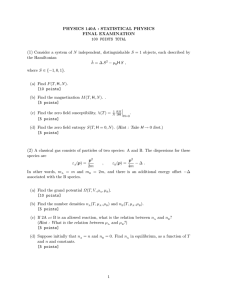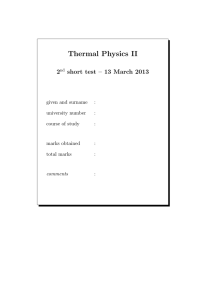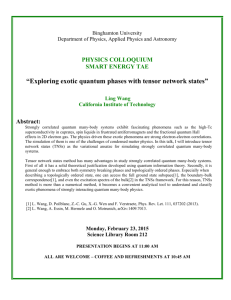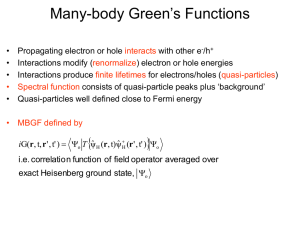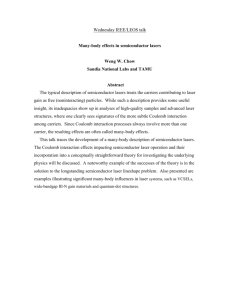Applications of Green`s Function Theory in Atoms and Nuclei
advertisement
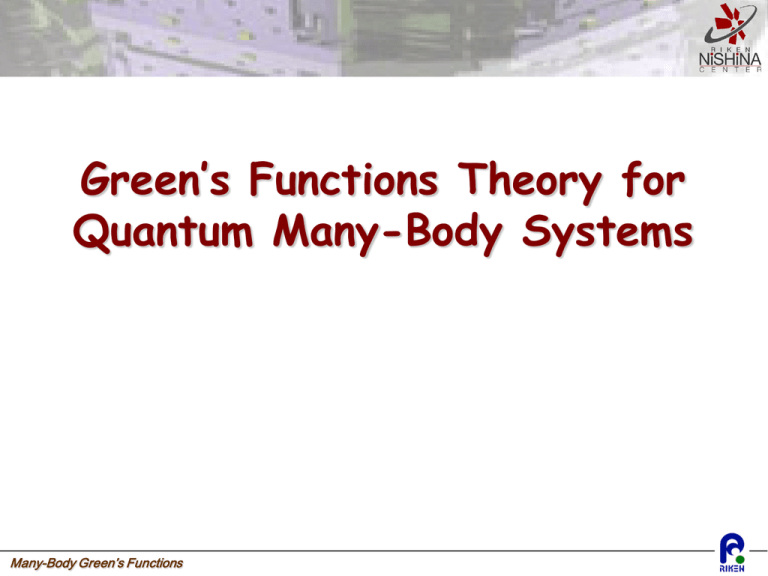
Green’s Functions Theory for
Quantum Many-Body Systems
Many-Body Green’s Functions
Contacts:
Carlo Barbieri
Theoretical Nuclear physics Laboratory
RIKEN, Nishina Center
At RIKEN:
RIBFビル, Room 405
電話番号: 048-462-111 ext. 4324
Email: 名前@riken.jp, 名前=barbieri
Lectures website: http://ribf.riken.jp/~barbieri/mbgf.html
Many-Body Green’s Functions
Many-Body Green’s Functions
Many-body Green's functions (MBGF) are a set of techniques that
originated in quantum field theory but have then found wide
applications to the many-body problem.
In this case, the focus are complex systems such as crystals,
molecules, or atomic nuclei.
Development of formalism: late 1950s/ 1960s imported from
quantum field theory
1970s – today applications and technical developments…
Many-Body Green’s Functions
Purpose and organization
Many-body Green’s functions are a VAST formalism. They have a wide
range of applications and contain a lot of information that is accessible
from experiments.
Here we want to give an introduction:
Teach the basic definitions and results
Make connection with experimental quantities gives insight into
physics
Discuss some specific application to many-bodies
Many-Body Green’s Functions
Purpose and organization
Most of the material covered here is found on
W. H. Dickhoff and D. Van Neck, Many-Body Theory Exposed!,
(covers both formalism and recent applications
very large 700+ pages)
I will provide:
•notes on formalism discussed (partial)
•the slides of the lectures
Download from the website:
http://ribf.riken.jp/~barbieri/mbgf.html
Many-Body Green’s Functions
Literature
Books on many-body Green’s Functions:
•
W. H. Dickhoff and D. Van Neck, Many-Body Theory Exposed!, 2nd ed.
(World Scientific, Singapore, 2007)
•
A. L. Fetter and J. D. Walecka, Quantum Theory of Many-Particle Physics,
(McGraw-Hill, New York, 1971)
A. A. Abrikosov, L. P. Gorkov and I. E. Dzyaloshinski, Methods of Quantum
Field Theory in Statistical Physics (Dover, New York, 1975)
•
•
•
•
•
R. D. Mattuck, A Guide to Feynmnan Diagrams in the Many-Body Problem,
(McGraw-Hill, 1976) [reprinted by Dover, 1992]
J. P. Blaizot and G. Ripka, Quantum Theory of Finite Systems, (MIT Press,
Cambridge MA, 1986)
J. W. Negele and H. Orland, Quantum Many-Particle Systems, (Benjamin,
Redwood City CA, 1988)
…
Many-Body Green’s Functions
Literature
Recent reviews:
•
F. Aryasetiawan and O. Gunnarsson, arXiv:cond-mat/9712013. GW method
•
G. Onida, L. Reining and A. Rubio, Rev. Mod. Phys. 74, 601 (2002). comparison of
TDDTF and GF
•
•
H. Mϋther and A. Polls, Prog. Part. Nucl. Phys. 45, 243 (2000).
C.B. and W. H. Dickhoff, Prog. Part. Nucl. Phys. 52, 377 (2004).
(Some) classic papers on formalism:
• G. Baym and L. P. Kadanoff, Phys. Rev. 124, 287 (1961).
• G. Baym, Phys. Rev. 127, 1391 (1962).
•
L. Hedin, Phys. Rev. 139, A796 (1965).
Many-Body Green’s Functions
Applications to
nuclear physics
Schedule (4 weeks)
Date
Time
Content (tentative)
4/6(月)
15:00-16:30
second quantization (review),
definitions of GF
4/9(木)
14:00-15:30
Basic properties and sum rules
4/9(木)
16:00-17:30
Link to experimental quantities
4/13(月)
15:00-16:30
Equation of motion method,
expansion of the self-energy
4/16(木)
13:30-15:00
Introduction to Feynman
diagrams
4/16(木)
15:30-17:00
Self-consistency and RPA
week break
Many-Body Green’s Functions
Basics and
link to
spectroscopy
Advanced
formalism
Schedule (4 weeks)
Date
Time
Content (tentative)
4/27(月)
15:00-16:30
RPA and GW method
4/27(木)
13:30-15:00
4/27(木)
15:30-17:00
Particle-vibration coupling,
applications for atoms and
nuclei
Systems of bosons
Golden week break
5/14(木)
13:30-15:00
Superfluidity,
BCS/BEC cross over
5/14(木)
15:30-17:00
Cold atoms
5/18(月)
15:00-16:30
Finite temperature/nucleonic
matter (time permitting)
Many-Body Green’s Functions
Practical
calculations
for fermions
Bosons and
other
applications
• Green’s functions
• Propagators
• Correlation functions
names for the same objects
• Many-body Green’s functions Green’s functions applied to the
MB problem
• Self-consistent Green’s functions (SCGF) a particular
approach to calculate GFs
Many-Body Green’s Functions
GFMC と
MBGF の違い は 何 ですか??
In Green’s Function Monte Carlo one starts with a “trial” wave function,
and lets it propagate in time:
For t-i∞, this goes
to the gs wave function!
Better to break the time in many little intervals Δt,
Green’s function (GF)
Monte Carlo
integral (MC)
GFMC is a method to compute the exact wave function.
(typically works for few bodies, A ≤ 12 in nuclei).
Many-Body Green’s Functions
GFMC と
MBGF の違い は 何 ですか??
MBGF is a method that DO NOT compute the wave function:
It assumes that the system is in its ground state and attempts
at calculating simple excitation on from it directly
•Large N (number of particles)
•The N-body ground state plays the role of vacuum (of excitations)
•Degrees of freedom are a few particles (or holes) on top of this
vacuum
•It is a microscopic method (and capable of “ab-initio” calculations)
Many-Body Green’s Functions
GFMC と
MBGF の違い は 何 ですか??
Don’t get confused:
Green’s function Monte Carlo (GFMC) and
Many-body Green’s Functions
are NOT the same method!!!!!!
Many-Body Green’s Functions
One-hole spectral function -- example
σred ≈ S(h)
independent
particle picture
10-50
correlations
0p1/2
0p3/2
0s1/2
Saclay data for 16O(e,e’p)
[Mougey et al., Nucl. Phys. A335, 35 (1980)]
Em [MeV]
S ( h ) ( pm , Em ) = ∑ | ⟨ ΨnA−1 | c p | Ψ0A ⟩ |2 δ ( Em − ( E0A − EnA−1 ))
n
m
distribution of momentum (pm) and energies (Em)
Many-Body Green’s Functions
Examples of quasiparticles – Nuclei-I
The nuclear force has strong repulsive behavior at short
distances
The short range core is:
•required by elastic NN
scattering
•supported by high-energy
electron scattering (Jlab)
•and supported by Lattice-QCD
(Ishii now in 東大)
Repulsive core: 500 - 600 MeV
Attractive pocket: about 30 MeV
Yukawa tail ∝ e-mr/r
[From N. Ishii et al. Phys. Rev. Lett. 99, 022001 (2007)]
Many-Body Green’s Functions
Examples of quasiparticles – Nuclei-II
Nucleons attract themselves at intermediate distances and scatter
like billiard balls:
Naively, nuclei cannot be treated as orbits structures
“GOOD” model of a nucleus
“BAD” model of a nucleus
Many-Body Green’s Functions
Examples of quasiparticles – Nuclei-III
…BUT, understanding
binding energies and magic
number DOES require a
shell structure!!!
Single particle orbits?
• M. G. Mayer, Phys. Rev. 75, 1969 (1949)
• O. Haxel, J. H. D. Jensen and
H. E. Suess, Phys. Rev. 75, 1766 (1949)
Nobel prize (1 963)!
Many-Body Green’s Functions
Examples of quasiparticles – ions in liquid
+
-
-
-
- +
+
- +
+
+
+
+
+
+ - + - + - + + - +
-
-
Ions in a liquid screen each other’s charge and interact weakly
[Picture adapted form Mattuck]
Many-Body Green’s Functions
Examples of quasiparticles – ions in liquid
+
-
-
-
- +
+
- +
+
+
+
+
+
+ - + - + - + + - +
-
-
Ions in a liquid screen each other’s charge and interact weakly
[Picture adapted form Mattuck]
Many-Body Green’s Functions
Examples of quasiparticles – ions in liquid
+
-
-
-
- +
+
- +
+
+
+
+
+
+ - + - + - + + - +
-
-
Ions in a liquid screen each other’s charge and interact weakly
[Picture adapted form Mattuck]
Many-Body Green’s Functions
Examples of quasiparticles – electron in gas
[Picture adapted form Mattuck]
Many-Body Green’s Functions
Second quantization
Choose an orthonormal single-particle basis {α} and use
it to build bases for the many-body states.
E.g.,
Need states of different particle number N
use the Fock space:
=1 for fermions
= ∞ for bosons
It must include the vacuum state:
Many-Body Green’s Functions
Second quantization
Basis states for bosons are constructed as
creation and annihilation operators give
Commutation rules:
Many-Body Green’s Functions
Second quantization
Basis states for fermions are constructed as
creation and annihilation operators give
with:
Commutation rules:
Many-Body Green’s Functions
Pictures in quantum mechanics
Consider an N-body system in a state
The time evolution operator is
time
evolution
equation:
Schrödinger pict.
at time t=t0.
Heisenberg pict.
for a time-indep. OS
solutions:
does not evolve
Many-Body Green’s Functions
same time!
Propagating a free particle
Consider a free particle with Hamiltonian
h1 = t + U(r)
the eigenstates and egienenergies are
The time evolution is
with:
Many-Body Green’s Functions
wave fnct. at t=0
wave fnct. at time t
Propagating a free particle
Green’s function (=propagator) for a free particle:
position
r1
r2
r3
r1’
r2’
r3’
Many-Body Green’s Functions
time
Propagating a free particle
Green’s function (=propagator) for a free particle:
Fourier transform
of the eigenspectrum!
states
energies
Many-Body Green’s Functions
The spectrum of the Hamiltonian
is separated by the FT because
the time evolution is driven
by H:
Definitions of Green‘s functions
Take a generic the Hamiltonian H and its static
Schrödinger equation
We evolve in time the field operators instead of the
wave function by using the Heisenberg picture
( creation/annihilation of a particle in r at time t)
Many-Body Green’s Functions
Definitions of Green‘s functions
The one body propagator (≡Green’s function)
associated to the ground state
is defined as
with the time ordering operator
aadds a particle
(+ for bosons,
- for fermions)
Expand t-dep in operators:
Many-Body Green’s Functions
removes a
particle
Definitions of Green‘s functions
With explicit time dependence:
t’
t
r
r’
t
Many-Body Green’s Functions
r’
adds a
particle
removes
a particle
r
t
Definitions of Green‘s functions
Green’s function can be defined in any single-particle
basis (not just r or k space). So let’s call {α} a general
orthonormal basis with wave functions {uα(r)}
The Heisenberg operators are:
and
Many-Body Green’s Functions
Definitions of Green‘s functions
In general it is possible to define propagators for more
particles and different times:
…
Many-Body Green’s Functions
Definitions of Green‘s functions
Graphic conventions:
α
β
β
≡ gαβ(t>t’)
(quasi)particle
α
α
time
t1
β
t2
2p
(N+2)-body
g4-pt
αβ,γδ
δ
γ
Many-Body Green’s Functions
p; (N+1)-body
t2’
t1 ’
p; (N+1)-body
≡ gαβ(t’>t)
(quasi)hole
Definitions of Green‘s functions
Graphic conventions:
α
β
≡ gαβ(t>t’)
(quasi)particle
β
α
α
time
γ
t1
t1 ’
ph
N-body
g4-pt
αβ,γδ
δ
β
Many-Body Green’s Functions
p; (N+1)-body
t2’
t2
h; (N-1)-body
≡ gαβ(t’>t)
(quasi)hole
Definitions of Green‘s functions
With explicit time dependence:
t’
t
r‘
r
t
Many-Body Green’s Functions
r
adds a
particle
removes
a particle
r’
t
Lehmann representation and spectral function
Expand on the eigenstates of N±1
(- bosons,
+ fermions)
Fourier transform to energy representation…
Many-Body Green’s Functions
Lehmann representation and spectral function
The Lehman representation of gαβ(ω) is:
(quasi)particles
(quasi)holes
Poles energy absorbed/released in particle transfer
Residues:
particle addition
particle ejected
Many-Body Green’s Functions
Lehmann representation and spectral function
The Lehman representation of gαβ(ω) is:
(quasi)particles
(quasi)holes
(- bosons,
+ fermions)
To extract the imaginary part:
Many-Body Green’s Functions
Lehmann representation and spectral function
The spectral function is the Im part of gαβ(ω)
(quasi)particles
(quasi)holes
(- bosons,
+ fermions)
Contains the same information as the Lehmann rep.
Many-Body Green’s Functions
Lehmann representation and spectral function
gαβ(ω) is fully constrained by its imaginary part:
Many-Body Green’s Functions
